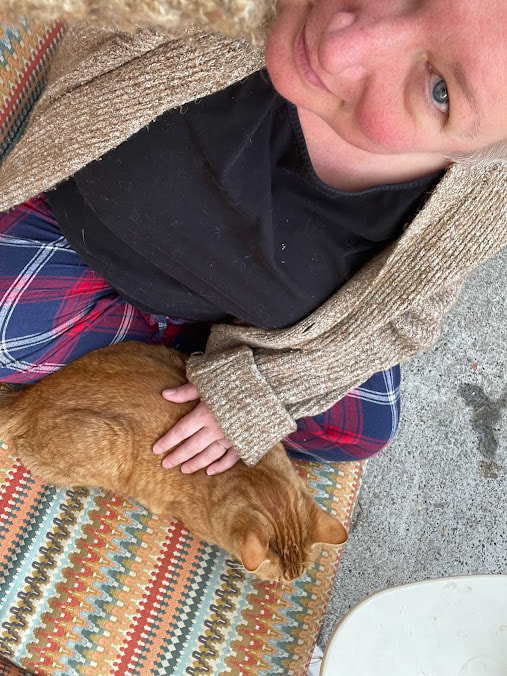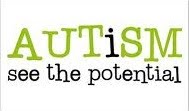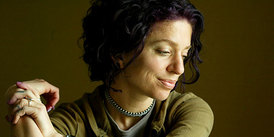
There's a great line in an Ani DiFranco song, Alla This, that has me thinking. Ani sings, "…and I will not rest a wink, until the women have regrouped." It's got me wondering - where do I see women grouped? Are we organizing in the way/s that Ani has in mind? How have we grouped ourselves historically versus today?
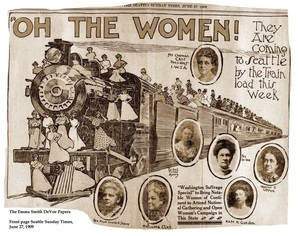
I suspect that Ani is referring to political organizing like we saw with the Suffragettes' efforts to gain the vote for women or the efforts of feminists in the 1960s for the Equal Rights Amendment. I'm not that politically savvy these days, but I don't see the headlines declaring that same kind of organizing today. Women organizing does show up in social media around specific events and some key issues, for example: the #YesAllWomen campaign following Elliott Rodger's violence and murders in CA, the #BringBackOurGirls campaign following the mass kidnapping of 234 Nigerian female students, and Sheryl Sandburg's #BanBossy campaign to foster leadership skills and confidence in young women. And I love what I'm seeing online from Body Positivity folks in terms of promoting images of non-airbrushed women and declaring the beauty and worth of all body types.
Do social media campaigns count as organizing? In the new era of "slacktivism" does social media have the same (or better or worse) effects as political demonstrations and legislation? To implement real, lasting change in our society we need to change hearts and minds, not only words on paper, even very important pieces of paper, like amendments to the Constitution and our laws. What role, if any, does the virtual world play in the big picture of awareness, understanding, and social change in the real world?
My graduate school training in social change suggests that change happens at the level of people talking together and builds from there. It ebbs and flows, for sure, and social ills adapt into different forms as well (consider that we now condemn lynching young black men, yet we warehouse them in our prisons instead?). But change is cultivated at the level of personal change, people living experiences or hearing stories that alter their expectations, assumptions, and common sense about the social world.
My formative years as an Evangelical Christian instructed me that people need to hear the good news of the gospel, hear the stories that can change them, and that it's our responsibility to speak up and create those opportunities for change. It's uncomfortable work that often falls on deaf ears when it doesn't provoke out right retaliation. Frankly, once I reached my teen years, and had a sense of social behavior, I really wasn't into evangelism. It felt rude, forced, and sort of unfounded - surely everyone I met already knew about Jesus and could make their own private decision without me. But does the same apply for all social issues? What is the "right" way to share our societal "good news" and bring change to individuals and communities? How simple or difficult is it really? Where and how do I join the conversation on the issues that matter to me?
Do social media campaigns count as organizing? In the new era of "slacktivism" does social media have the same (or better or worse) effects as political demonstrations and legislation? To implement real, lasting change in our society we need to change hearts and minds, not only words on paper, even very important pieces of paper, like amendments to the Constitution and our laws. What role, if any, does the virtual world play in the big picture of awareness, understanding, and social change in the real world?
My graduate school training in social change suggests that change happens at the level of people talking together and builds from there. It ebbs and flows, for sure, and social ills adapt into different forms as well (consider that we now condemn lynching young black men, yet we warehouse them in our prisons instead?). But change is cultivated at the level of personal change, people living experiences or hearing stories that alter their expectations, assumptions, and common sense about the social world.
My formative years as an Evangelical Christian instructed me that people need to hear the good news of the gospel, hear the stories that can change them, and that it's our responsibility to speak up and create those opportunities for change. It's uncomfortable work that often falls on deaf ears when it doesn't provoke out right retaliation. Frankly, once I reached my teen years, and had a sense of social behavior, I really wasn't into evangelism. It felt rude, forced, and sort of unfounded - surely everyone I met already knew about Jesus and could make their own private decision without me. But does the same apply for all social issues? What is the "right" way to share our societal "good news" and bring change to individuals and communities? How simple or difficult is it really? Where and how do I join the conversation on the issues that matter to me?
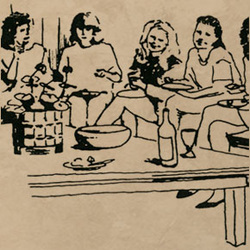
I've baby-stepped my way in and around women's organizing all my life. As a child, I participated in girls' groups organized with and by women around the tenets of our religion. In college, I organized a women's group around the issues we were living with as young women on a Christian college campus. In the last ten years of graduate school and motherhood I've participated with anti-war groups like Women in Black and CodePink, as well as women's spirituality groups, like my current pagan circle. In many ways, these groups felt like "preaching to the choir." They consisted of like-minded folks gathering and sharing like-minded ideas with each other. Although Women in Black and CodePink are both groups with public presence, it's not clear to me what our influence may have been on social change. Maybe it is enough to be a public presence and bear witness that there are other ways of perceiving, interpreting, and responding to situations that our government and our society have gotten us all into.
Even so, most of the groups I'm aware of and participate in are private and personal. Women sitting together, talking, discussing books, sharing their lives. I believe that these groups have value, privately and publicly - and may be/become the women regrouping that Ani sings about. In these small, private groups women start to see patterns of what is not ok with us in the broader social world. The next step is to speak up into the public world, describing what is not ok and suggesting, promoting, and supporting alternatives.
My pagan group gathers in part as a means of recognizing and undoing the negative we've experienced in male dominated organized religions. Here's where "preaching to the choir" works - there's resonance in an affinity group that says, "me too, I experienced that too, and it's not ok." Alienation is replaced with validation and a sense of sanity; a new common sense is established for the participants. Additionally, our group practices new forms of spiritual expression together. We do all of this privately, in each other's homes. Over the years of meeting we've come to know each other better, learned to trust each other, and started to share more both about our private lives and our public lives. We are becoming a source of vitality and support for each other in both spheres. Today, we are likely to circulate a petition for signatures around the group sharing in political activity together or participate together in events hosted by larger, public women's groups like Women of Wisdom or Gaia's Temple. We're hardly a force to be reckoned with, in terms of social change around women's spirituality, but we have significance in each other's lives and our immediate community.
The Feminists of the 1960s and 1970s used a mobilizing phrase, "the personal is political." I think that's another piece of what Ani is singing about in Alla This. I think she's looking for an awareness among women that what we experience personally is derived from and has implications for the public, political sphere. It's another call to mobilize women to recognize the lived conditions of our lives and speak up for change. Challenges in our lives are not merely our own dumb luck but are also reinforced/manufactured by public, collective structures that have public, collective solutions. If those solutions are to be cultivated, then we need voices identifying the ills and proposing and supporting the alternatives.
A small, private group like my pagan circle inhabits the gray area of "the women have regrouped." We've identified personal challenges with a public or collective status quo and designed a largely personal solution in response. Maybe that's where other women have grouped themselves for the time being while scrambling to make ends meet, experiencing discouragement with the public and political processes of change, seeing how far women have already made it, and feeling unclear on the changes yet to be made.
Both of the mediums for social change that I've been involved with are rumored to be dead or dying - the Church and Feminism. I see it more as a cycle of renewal and rebirth as these two social forces adjust to contemporary expectations, new collective common sense about human rights and political processes, competing understandings of which social changes are needed, as well as age old American individualism. Today's feminism is not only about changes for women, though those needs certainly remain as we examine violence against women, health care designed around men as the norm, leadership issues, faith communities, living wages for single mothers and others, affordable, high quality childcare…, but also for social change that affects men and children (and animals and the planet…). Women offer a different perspective coming from a different lived experience of social conditions. We can offer particular insight into the consequences (intended or unintended) of current social and political trends.
I think the gray area is an ok place to be, right now. It provides a safe place to start making change. It serves as an incubator for the next iteration of contemporary social forces, like the Church and Feminism. The gray area is a margin or liminal space where we are secure to claim, "yes, this is working," and to identify, "whoa, no way, that doesn't work, it needs to change, we need XYZ…" Here, we adapt and experiment with new ways of being together. The next challenge is to bring those ideas and methods into the broader social collective, in both the virtual and real worlds.
I love my little pagan circle in the gray area. I am grateful for the strength and encouragement it offers me personally and the alternative it provides to mainline faith communities. In my pagan circle I feel seen and heard, I experience affirming resonance, and practice our own creative solutions. I carry that with me as I interact in my daily life of job and family and friendships. I develop a fresh lens for viewing the world and a clearer voice for speaking my/our truth.
Ani may not be able to rest but I suggest that she could grab a catnap - there is certainly a lot of effort ahead. But the women are regrouping in this transitional social ecosystem. Preparing to grow from the margins into the main, like wildflowers and herbs, bringing beauty and salve to abused landscapes. Our voices are made stronger individually and collectively as we are supported and stretched in the liminal gray.
Even so, most of the groups I'm aware of and participate in are private and personal. Women sitting together, talking, discussing books, sharing their lives. I believe that these groups have value, privately and publicly - and may be/become the women regrouping that Ani sings about. In these small, private groups women start to see patterns of what is not ok with us in the broader social world. The next step is to speak up into the public world, describing what is not ok and suggesting, promoting, and supporting alternatives.
My pagan group gathers in part as a means of recognizing and undoing the negative we've experienced in male dominated organized religions. Here's where "preaching to the choir" works - there's resonance in an affinity group that says, "me too, I experienced that too, and it's not ok." Alienation is replaced with validation and a sense of sanity; a new common sense is established for the participants. Additionally, our group practices new forms of spiritual expression together. We do all of this privately, in each other's homes. Over the years of meeting we've come to know each other better, learned to trust each other, and started to share more both about our private lives and our public lives. We are becoming a source of vitality and support for each other in both spheres. Today, we are likely to circulate a petition for signatures around the group sharing in political activity together or participate together in events hosted by larger, public women's groups like Women of Wisdom or Gaia's Temple. We're hardly a force to be reckoned with, in terms of social change around women's spirituality, but we have significance in each other's lives and our immediate community.
The Feminists of the 1960s and 1970s used a mobilizing phrase, "the personal is political." I think that's another piece of what Ani is singing about in Alla This. I think she's looking for an awareness among women that what we experience personally is derived from and has implications for the public, political sphere. It's another call to mobilize women to recognize the lived conditions of our lives and speak up for change. Challenges in our lives are not merely our own dumb luck but are also reinforced/manufactured by public, collective structures that have public, collective solutions. If those solutions are to be cultivated, then we need voices identifying the ills and proposing and supporting the alternatives.
A small, private group like my pagan circle inhabits the gray area of "the women have regrouped." We've identified personal challenges with a public or collective status quo and designed a largely personal solution in response. Maybe that's where other women have grouped themselves for the time being while scrambling to make ends meet, experiencing discouragement with the public and political processes of change, seeing how far women have already made it, and feeling unclear on the changes yet to be made.
Both of the mediums for social change that I've been involved with are rumored to be dead or dying - the Church and Feminism. I see it more as a cycle of renewal and rebirth as these two social forces adjust to contemporary expectations, new collective common sense about human rights and political processes, competing understandings of which social changes are needed, as well as age old American individualism. Today's feminism is not only about changes for women, though those needs certainly remain as we examine violence against women, health care designed around men as the norm, leadership issues, faith communities, living wages for single mothers and others, affordable, high quality childcare…, but also for social change that affects men and children (and animals and the planet…). Women offer a different perspective coming from a different lived experience of social conditions. We can offer particular insight into the consequences (intended or unintended) of current social and political trends.
I think the gray area is an ok place to be, right now. It provides a safe place to start making change. It serves as an incubator for the next iteration of contemporary social forces, like the Church and Feminism. The gray area is a margin or liminal space where we are secure to claim, "yes, this is working," and to identify, "whoa, no way, that doesn't work, it needs to change, we need XYZ…" Here, we adapt and experiment with new ways of being together. The next challenge is to bring those ideas and methods into the broader social collective, in both the virtual and real worlds.
I love my little pagan circle in the gray area. I am grateful for the strength and encouragement it offers me personally and the alternative it provides to mainline faith communities. In my pagan circle I feel seen and heard, I experience affirming resonance, and practice our own creative solutions. I carry that with me as I interact in my daily life of job and family and friendships. I develop a fresh lens for viewing the world and a clearer voice for speaking my/our truth.
Ani may not be able to rest but I suggest that she could grab a catnap - there is certainly a lot of effort ahead. But the women are regrouping in this transitional social ecosystem. Preparing to grow from the margins into the main, like wildflowers and herbs, bringing beauty and salve to abused landscapes. Our voices are made stronger individually and collectively as we are supported and stretched in the liminal gray.
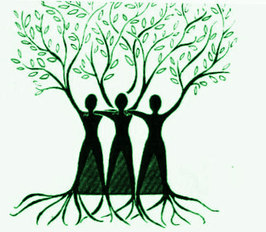
 RSS Feed
RSS Feed
